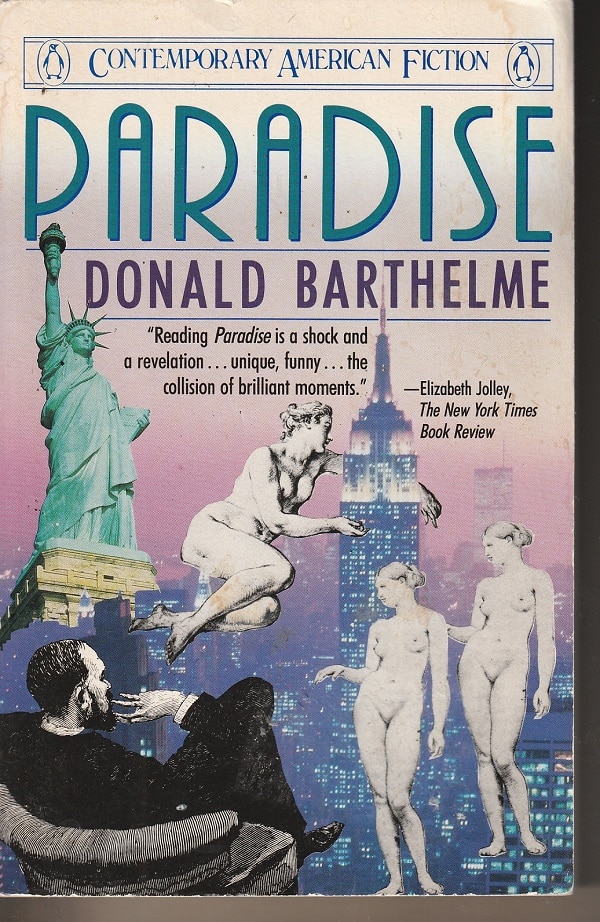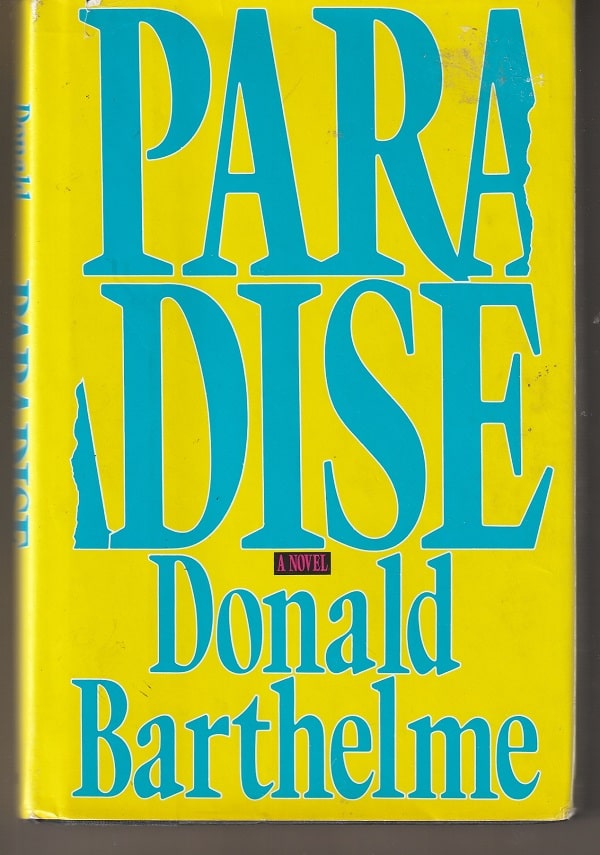Maybe it was funnier and more interesting back in 1986 — Paradise, I mean, the thin, wispy novel by Donald Barthelme.

Or maybe Barthelme just had a harder time sustaining fiction for a full book. He was known, after all, mainly for the scores of short stories he published, many of which were extremely short, to the point of being described in retrospect as very similar to modern-day flash fiction.
Paradise was only his third novel, and it was built on a fairly slender plot, to wit:
Simon, a relatively unambitious architect, finds a pipe-bomb under his car in Philadelphia where his lawyer wife Carol is deputy mayor. He decides it would be best to take a sabbatical by moving for a time to Manhattan. He sublets a large barely furnished apartment, and, soon afterwards, at five o’clock one afternoon, he walks into a hotel bar and…
there were these three women, tall, statuesque even. In a crowd of people. People were sitting at tables and sitting at the bar, and the women were chatting with them. Wearing this marvelous white lingerie. And everyone was being very calm, very cool.
Talking to one of the women, he finds that the three are models from Denver whose job plans in New York have fallen through and who have no money because they’ve each sent $3,000 to Africa to fight hunger after seeing some show on TV and who now have no place to stay.
He offers them the use of his apartment, and they move in. Hence, the paradise of the title. Or as a friend of his calls it, “hog heaven.”
Except it’s not.
The crux of the novel
Simon pays for the rent and the food and even goes out to buy three beds, except, on many nights, one or more of the women is in bed with him although, as they mention on more than one occasion, his stamina ain’t what it might be.
Simon is, after all, 53.
That’s the crux of the novel. And, actually, that’s the biggest reason this book falls flat today.
It’s a male-centric book for a target audience of men. It’s a rumination on how something that should be the Garden of Eden for a guy — a guy on sabbatical from his regular life and regular wife — isn’t because, well, the guy’s old.
Talk about out of tune with 2023.
Except Simon

The three women here function as a Greek chorus, uniformly gorgeous, uniformly quirky, as alike as peas in a pod.
The focus of everything is Simon who’s no macho male but something of a Sad Sack with opinions. Everything about the plot and the novel is exaggerated except Simon.
The women and the setting and the pipe-bomb and a doctor friend with whom Simon converses and a red-haired poet who catches Simon’s fancy and a sort of boyfriend of one of the women who’s a professional whistler (the boyfriend, that is) and, well, everything about the novel is over the top.
Except Simon.
I think that was Barthelme’s point. Simon is supposed, I imagine, to be an Everyman.
But he’s kind of boring, and it’s hard to see how any female reader might find him or the novel all that interesting. Or male reader, for that matter.
I didn’t.
Patrick T. Reardon
5.23.23
Written by : Patrick T. Reardon
For more than three decades Patrick T. Reardon was an urban affairs writer, a feature writer, a columnist, and an editor for the Chicago Tribune. In 2000 he was one of a team of 50 staff members who won a Pulitzer Prize for explanatory reporting. Now a freelance writer and poet, he has contributed chapters to several books and is the author of Faith Stripped to Its Essence. His website is https://patricktreardon.com/.
